Related Research Articles
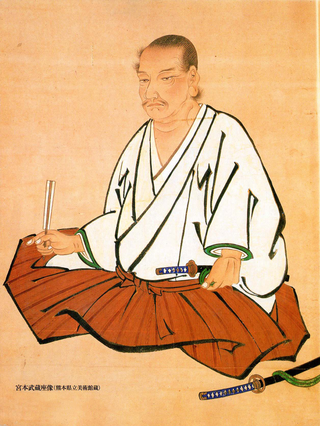
Miyamoto Musashi, also known as Shinmen Takezō, Miyamoto Bennosuke or, by his Buddhist name, Niten Dōraku, was a Japanese swordsman, philosopher, strategist, writer and rōnin, who became renowned through stories of his unique double-bladed swordsmanship and undefeated record in his 61 duels. Musashi, as he was often simply known, is considered a Kensei, a sword-saint of Japan. He was the founder of the Niten Ichi-ryū, or Nito Ichi-ryū, style of swordsmanship, and in his final years authored The Book of Five Rings and Dokkōdō.

Shigeru Miyamoto is a Japanese video game designer, producer and game director at Nintendo, where he serves as one of its representative directors as an executive since 2002. Widely regarded as one of the most accomplished and influential designers in video games, he is the creator of some of the most acclaimed and best-selling game franchises of all time, including Mario,The Legend of Zelda, Donkey Kong, Star Fox and Pikmin. More than 1 billion copies of games featuring franchises created by Miyamoto have been sold.
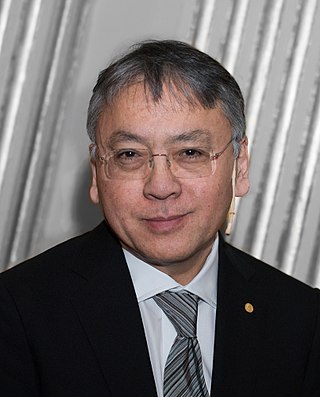
Sir Kazuo Ishiguro is a British novelist, screenwriter, musician, and short-story writer. He is one of the most critically acclaimed and praised contemporary fiction authors writing in English, having been awarded the 2017 Nobel Prize in Literature. In its citation, the Swedish Academy described Ishiguro as a writer "who, in novels of great emotional force, has uncovered the abyss beneath our illusory sense of connection with the world".
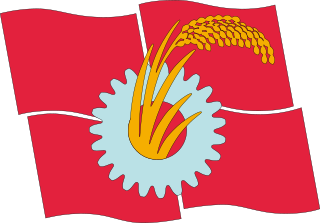
The Japanese Communist Party is a communist party in Japan. Founded in 1922, it is the oldest political party in the country. It has 270,000 members as of 2020, making it one of the largest non-governing communist parties in the world. The party is chaired by Tomoko Tamura, who replaced longtime leader Kazuo Shii in January 2024.

Nintendo Entertainment Analysis & Development Division, commonly abbreviated as Nintendo EAD and formerly known as Nintendo Research & Development No.4 Department, was the largest software development division within the Japanese video game company Nintendo. It was preceded by the Creative Department, a team of designers with backgrounds in art responsible for many different tasks, to which Shigeru Miyamoto and Takashi Tezuka originally belonged. Both served as managers of the EARD studios and were credited in every game developed by the division, with varying degrees of involvement. Nintendo EAD was best known for its work on games in the Donkey Kong, Mario, The Legend of Zelda, F-Zero, Star Fox, Animal Crossing, Pikmin, and Wii series.

Musashi Miyamoto is a 1954 Japanese film directed and co-written by Hiroshi Inagaki and starring Toshiro Mifune. The film is the first film of Inagaki's Samurai Trilogy of historical adventures.

Japan was the host nation for the 1964 Summer Olympics in Tokyo. 328 competitors, 270 men and 58 women, took part in 155 events in 21 sports.
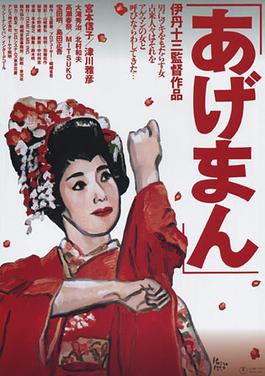
Tales of a Golden Geisha, also known as A-Ge-Man, is a 1990 Japanese comedy film directed and written by Juzo Itami. It stars Nobuko Miyamoto as a geisha who brings good luck to her intimate companions and Masahiko Tsugawa as a man who crosses paths with her by chance.

Isao Kimura, sometimes credited as Kō Kimura, was a Japanese stage and film actor who appeared in more than one hundred films of directors such as Akira Kurosawa, Mikio Naruse, Tadashi Imai and Yoshishige Yoshida.

Japan competed at the 1952 Summer Olympics in Helsinki, Finland. Japan returned to the Olympic Games after not being invited to the 1948 Summer Olympics because of the nations's role in World War II. 69 competitors, 58 men and 11 women, took part in 60 events in 13 sports.
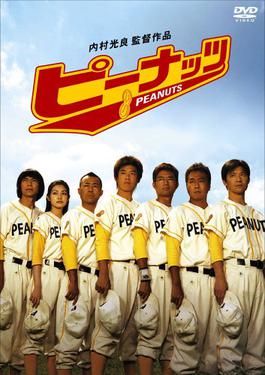
Peanuts (ピーナッツ) is a 2006 Japanese comedy baseball film written and directed by Teruyoshi Uchimura.
Lolita Anime is a collection of adult original video animations (OVA) produced by Wonder Kids. It contains many notable firsts, as the first erotic original video animation, depicting hentai scenes which include yuri, BDSM and lolicon characters. It ran from February 1984 to May 1985 and consisted of six episodes. An alternative name for this anime is Wonder Magazine Series and it was based on a manga by Fumio Nakajima, which was serialized in the lolicon magazine Lemon People.

Beat is a 1998 Japanese film. Directed by Amon Miyamoto, the film's narrative is set in Okinawa in the 1960s, during the military occupation by the American government. The plot was inspired by Naminoue no Maria, a novel by the Okinawan writer Eiki Matayoshi.
Hideki Mori is a Japanese manga artist. He made his professional debut in 1982 in Shōnen Sunday, after which he was chosen by Kazuo Koike to illustrate the continuation of Lone Wolf and Cub, Shin Lone Wolf and Cub. Mori is best known for his manga adaptation of Kenichi Sakemi's historical novel Bokkō, which was then adapted as the movie A Battle of Wits. Mori received the 1995 Shogakukan Manga Award for general manga for Bokkō. His other works include Umizuru and Aozora Shot, and the illustrations for Kajō. In 2013, published Shishi, a manga based on the life of Miyamoto Musashi.
Kaoru Kitamura is the pen name of Kazuo Miyamoto, a popular contemporary Japanese writer, mainly of short stories.

Tsuneyasu Miyamoto is a former Japanese football coach and former player who last coached Gamba Osaka. He played for Japan national team.
Shinmen Munisai, also called Miyamoto Muninosuke, was a martial artist, expert in using the sword and the jutte. He was also the father of the samurai named Miyamoto Musashi. He was the son of Miyamoto Musashi no kami Yoshimoto, a vassal of Shinmen Iga no Kami, the lord of Takayama Castle in the Yoshino district of Mimasaka Province. Munisai was relied upon by Lord Shinmen Sokan, the head of the Shinmen clan and so was allowed to use the Shinmen name. He was one of the few to have obtained the title of "Unrivaled Under The Sun", title offered to him by the Shōgun Ashikaga.
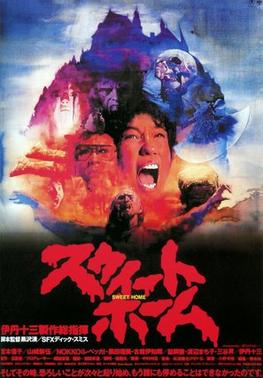
Sweet Home, also known as The Mamiya House, is a 1989 Japanese horror film directed by Kiyoshi Kurosawa and produced by Juzo Itami. It was released alongside a video game of the same title that inspired the Resident Evil game series released by Capcom.
Events in the year 1908 in Japan. It corresponds to Meiji 41 (明治41年) in the Japanese calendar.